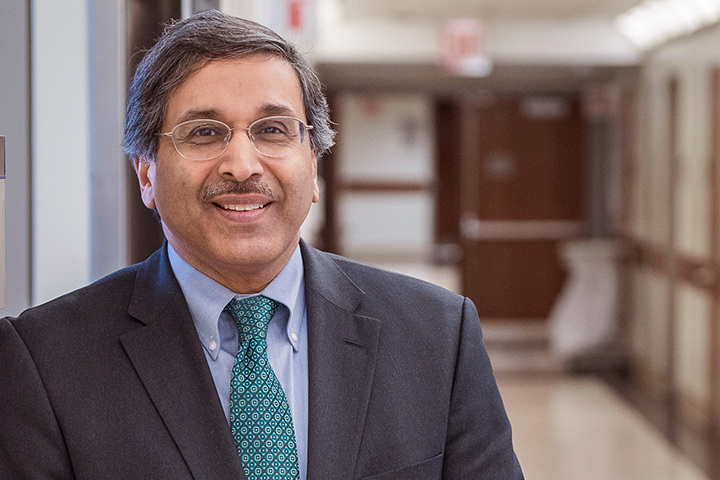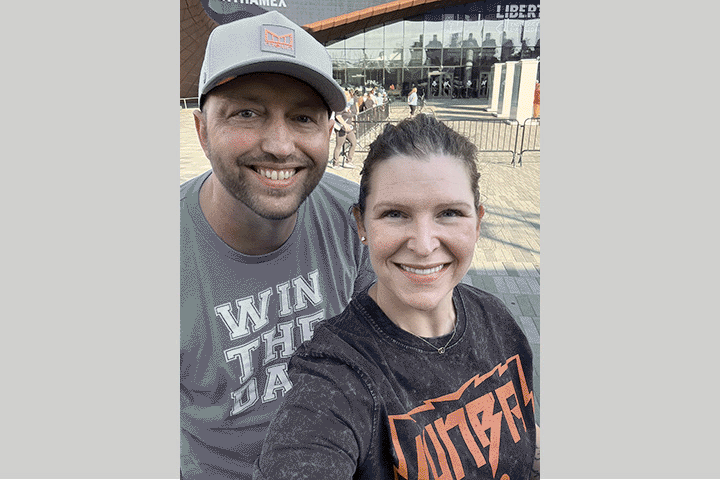The Future of Pancreatic Cancer Treatment

Anil K. Rustgi, M.D., is a physician-scientist.
He is the director of the Herbert Irving Comprehensive Cancer Center (HICCC) at Columbia University Irving Medical Center and NewYork-Presbyterian/Columbia University Irving Medical Center, in New York. Prior to his appointment at Columbia, Rustgi served as the T. Grier Miller Professor of Medicine and Genetics and Chief of Gastroenterology at the University of Pennsylvania’s Perelman School of Medicine, where he co-led the Tumor Biology Program.
Rustgi’s research focuses on what makes cancer tick and aims to hopefully uncover the secrets of the cell processes and tumor microenvironments that lead to the development, progression, and metastasis of gastrointestinal cancers such as pancreatic cancer. He has done pivotal work on how the interplay of cancer driver genes and the microenvironment can lead to the development of pancreatic cancer as well as metastasis.
Rustgi talked to Let’s Win about the current state of pancreatic cancer research and treatment and what it’s like leading a major cancer center during a pandemic.
Pancreas cancer remains one of the most lethal of all cancers, and in 2019 several major trials failed. Are you hopeful about what the next few years may bring?
What’s important is that we learn from every single clinical trial. There is absolutely no doubt we’re moving in the right direction in pancreas cancer. For so long we were stuck at about a 5 percent overall survival at five years, now we’re at around 10 percent. That may not sound like a lot but in the context of pancreas cancer, it’s dramatic. Currently, several things are being done and will continue to be done to build upon the advances we have made.
One of the most important is how we use information from genetic testing. About 5-10 percent of pancreas cancer patients have a family history, so-called hereditary pancreatic cancer. And that means there is a known cause like a genetic mutation that person inherited from one parent. There’s no standard screening program for pancreas cancer, but there are some strong screening programs at major centers, such as ours, which are focused on recognizing those at highest risk and how to best monitor them so disease can be caught in its earliest stage. This is the focus of my clinical practice and with ongoing research we, as a national community, are going to be able to help more people and hopefully increase survival even more.
We’re also doing interesting NIH-funded work in the role of pancreatitis in pancreatic cancer. The second area is in metastatic organotropism. In other words, why do certain primary pancreatic cancers have a tendency to metastasize to specific secondary sites, such as the liver or lungs. Now with the significant strides made in mouse models, 3-D organoids, and other systems, we have incredible tools at our disposal that can help us better understand the process.
Everyone’s always talking about earlier detection. Is there anything in this research that’s particularly intriguing to you?
There’s a lot of interesting research being done in what’s called type 3c diabetes. This type of diabetes has a sudden onset, later in life, and may be associated with pancreatic cancer. Pancreas cancer has such a high mortality rate often because it’s diagnosed at an advanced stage due to the absence of symptoms in its early stages. There is research showing type 3c diabetes could also be an early manifestation of pancreatic cancer. More precise markers to identify it correctly are required not only to provide adequate treatment to patients, but also because a correct classification may assist in an early diagnosis of pancreatic cancer. There’s a lot of epidemiological research going on and hopefully it may be possible to make an earlier diagnosis of pancreatic cancer by classifying patients with diabetes type 3c as a population with an increased probability of having early-stage pancreatic cancer.
What about treatment?
We need to improve upon our chemotherapeutic agents. This is why so many clinical trials are focused on this need. There is an intense effort throughout the world through clinical trials to improve with targeted therapeutics. To that end, clinical trials are increasingly trying to understand why some patients are not responding to certain types of therapy. We need to know what’s driving that resistance. Patient selection for a given trial is very important. The more one knows about how a particular drug attacks cancer, the more alignment there needs to be in terms of patient selection.
How do you see AI playing into pancreas cancer treatment?
“Artificial Intelligence,” or AI, has been around for a long time. Researchers are teaching computers to recognize the shape and architecture of the pancreas, and then teaching them to recognize the differences between a healthy pancreas and a malignant pancreas. It makes sense that we are going to see AI applications in a variety of diagnostic and predictive tasks. Machine learning capabilities really will offer clinicians the opportunity to more carefully tailor early cancer interventions—whether treatment-focused or preventative in nature—to each individual patient. I think we’re going to be seeing a lot of changes in the next few years with machine learning capabilities.
What would you tell someone who is diagnosed with pancreatic cancer today?
First, ascertain your family history. Second, it’s now evolved that everyone with pancreatic cancer should be getting genetic testing even without family history. The results of these tests can help determine the most effective treatments and whether family members would benefit from screening.
Third, staging is absolutely critical. The more we know about the patient, the more we know in selecting the right kind of therapies. Patients who may be surgical candidates may now get neoadjuvant treatment prior to surgery. If a patient has metastatic disease, clinical trials really should be explored and pursued.
Fourth, it’s really important to look at this disease and its treatment as a team effort of many specialties, including oncology, surgery, gastroenterology, radiology, pathology, and others. Dietitians are absolutely important to help maintain good nutritional intake. Social workers help with family and emotional support. Take advantage of everyone’s expertise.
What’s it been like running a major cancer center during a pandemic?
It’s been humbling. The background and foreground of this huge tragedy is that we’ve lost so many people here in New York, across the U.S., and throughout the world. I give inordinate credit to our faculty, our trainees, staff, our leadership, and every single person who works at our facilities. At Columbia and at NewYork-Presbyterian, there’s been a tremendous partnership to work toward a safe and healthy environment. We came from being an epicenter in the U.S. to becoming a safe environment for our patients and staff. There is a lot of motivation from everyone to continue and that’s inspirational. Every single day I feel the need to give back.
Are you hopeful about the future?
Yes, I am very optimistic about advances in the diagnosis and therapy of pancreatic cancer. Additionally, I’m passionate about training the next generation of leaders. Whether it’s pancreas cancer research and treatment or whether it’s finding a way to prevent and treat COVID-19, it’s very rewarding to see young minds, like the graduate students and the post-doctoral students, find their own way and get their own grants. They achieve independence and that means the future is in good hands.






